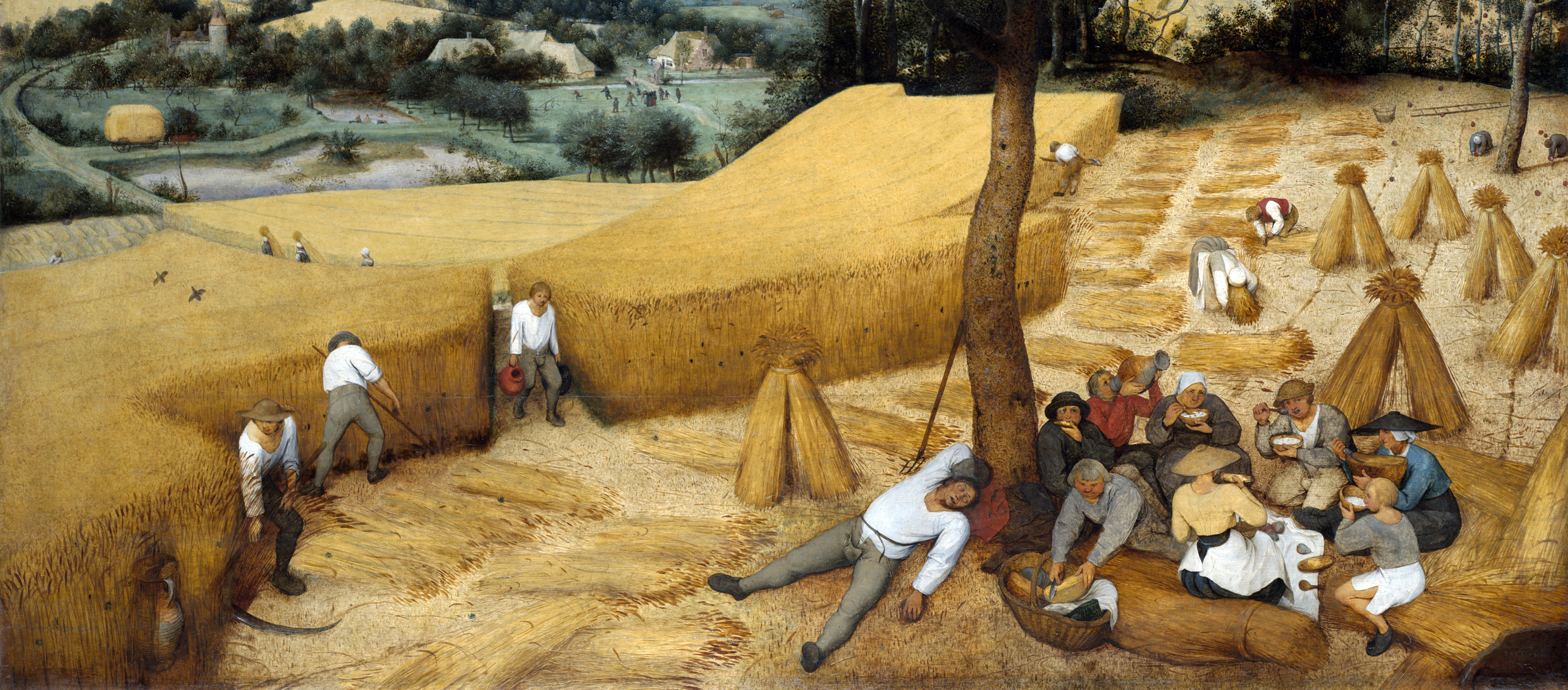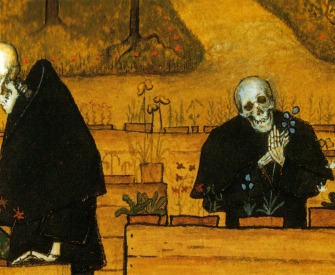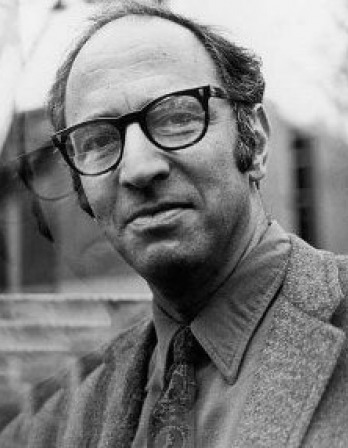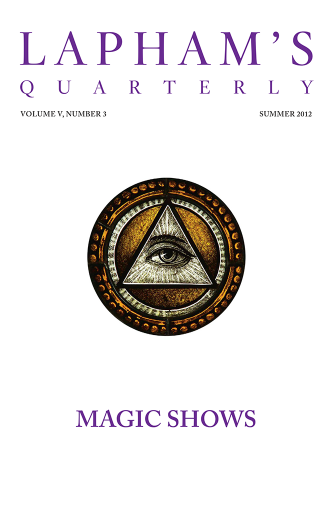It is difficult to get a man to understand something when his salary depends upon his not understanding it.
—Upton Sinclair, 1935Treasure Hunt
A person’s vocation has become more than a job—it should transform us into who we are.
By Alain de Botton

Office work, c. 1955. Photograph by Harris & Ewing. Library of Congress.
However powerful our technology and complex our corporations, the most remarkable feature of the modern working world may in the end be the widely held belief that our work should make us happy. Our choice of occupation is held to define our identity to the extent that the most insistent question we ask of new acquaintances is not where they come from or who their parents were but what they do, the assumption being that the route to a meaningful existence must invariably pass through the gate of remunerative employment.
It was not always this way. In the fourth century BC, Aristotle defined an attitude, which was to last almost two millennia, in the phrase “All paid jobs absorb and degrade the mind.” For the Greek philosopher, financial need placed one on a par with slaves and animals. The labor of the hands, as much as of the mercantile sides of the mind, would lead to psychological deformation. Only a private income and a life of leisure could afford citizens adequate opportunity to enjoy the higher pleasures of music and philosophy.
Early Christianity appended to Aristotle’s notion the still darker doctrine that the miseries of work are the appropriate means of expiating the sins of Adam. It was not until the Renaissance that new notes began to be heard. In the biographies of great artists, men like Leonardo da Vinci and Michelangelo, we hear early references to the glories of practical activity. While this reevaluation was at first limited to artistic work, and even then only to its most exalted examples, it came in time to encompass almost all occupations. By the middle of the eighteenth century, in a direct challenge to the Aristotelian position,
Denis Diderot and Jean le Rond d’Alembert published their twenty-eight-volume Encyclopédie, filled with articles celebrating the particular genius and joy involved in baking bread, planting asparagus, operating a windmill, forging an anchor, printing a book, and running a silver mine. Accompanying the text were illustrations of the tools employed to complete such tasks, among them pulleys, tongs, and clamps, instruments whose precise purpose readers might not always understand, but which they could nonetheless recognize as furthering the pursuit of skillful and therefore dignified ends.
Cafe House, Cairo (Casting Bullets), by Jean-Léon Gérôme, c. 1875. The Metropolitan Museum of Art, Bequest of Henry H. Cook, 1905. 
Purported to be a sober compendium of knowledge, the Encyclopédie was in truth a paean to the nobility of labor. Diderot said as much in his entry on “Art,” disparaging people inclined to venerate only the “liberal” arts (such as music and philosophy) while ignoring their “mechanical” equivalents (such as clockmaking and silk weaving): “The liberal arts have sung their own praise long enough; they should now raise their voice in praise of the mechanical arts. The liberal arts must free the mechanical arts from the degradation in which these have so long been held by prejudice.”
The bourgeois thinkers of the eighteenth century thus turned Aristotle’s formula on its head: satisfactions which the Greek philosopher had identified with leisure were now transposed to the sphere of work, while tasks lacking in any financial recompense were drained of all significance and relegated to the haphazard attentions of dilettantes. It now seemed as impossible that one could be happy and idle as it had once seemed unlikely that one could work and be human.
Aspects of this evolution in attitudes toward work had intriguing correlatives in ideas about love. In this sphere, too, the eighteenth-century bourgeoisie yoked together what was pleasurable and what was necessary. They argued that there was no inherent conflict between sexual passion and the practical demands of raising children in a family unit, and that there could hence be romance within a marriage—just as there could be enjoyment within an economic enterprise. On behalf of both marriage and employment, the propositions co-opted satisfactions hitherto pessimistically, or perhaps realistically, confined by aristocrats to the subsidiary realms of the love affair and the hobby.
It was with this history in mind that I became interested in meeting a career counselor, a professional dedicated to finding ways of ensuring that work will be synonymous with fulfillment.
An Internet search produced a company called Career Counseling International, whose website promised help for those facing “troubling life decisions and occupational choices.” This authoritative claim led me to expect large and well-appointed headquarters, but the company turned out to be run from the back of an unassuming and cramped Victorian home in a run-down residential street in South London. It featured a small administrative office and a consulting room with Paul Klee prints and views of a clotted carp-pond and a washing line. The only full-time employee, Robert Symons, a fifty-five-year-old psychotherapist, had started the business twelve years before, and ran it along with his wife June, who helped with the accounts and the marking of aptitude tests. Symons had studied psychology at Bristol University, where he had come under the influence of the humanistic school of psychology, which emphasized creativity and self-development.
Symons was a tall and bearded man who looked as if he could wrestle a wolf to the ground, but his physical might belied the patient manner of a priest. One could imagine him in another era as the curate of a peaceful rural parish, keeping bees and a tortoise in the garden, believing in little, but ministering with exceptional sincerity to the needs of the sick and the troubled.
Three days a week Symons saw private clients in his house, and on the remaining two he visited businesses around the country, advising workers about to be laid off or managers who were having difficulty shouldering their responsibilities. He also offered motivational seminars for the unemployed, psychometric testing for interviews, and from a stand at university careers fairs, sessions with graduates preparing to enter the job market.
We agreed that I should observe his working methods over a number of weeks, and three days later I was ensconced in a tight cupboard that served for a study, looking at a black-and-white screen showing the events unfolding in the consulting room next door, where the first client of the day had begun summing up her personal history and professional dissatisfactions with a compelling mixture of formality and honesty. There were papers and files stacked up to the ceiling all around me and, on the floor, a bag of Symons’ sports equipment, emitting the strong smell of recently used gym shoes. The client’s voice could be heard both through the loudspeaker on the monitor and more directly through the walls. It was one of those crystalline, perfectly enunciated English voices, the sort one might acquire growing up in Walton-on-Thames and graduating with a First in History from Keble College, Oxford. Through a slit in the door, I could see the client’s coat hanging in the hall, a rich blue cashmere garment freckled with water, along with a slim leather briefcase.
Three times the client interrupted her own anecdotes, suddenly pushing back her hair and saying, “I’m so sorry, this must be unbearably boring,” to which Symons shot back calmly, as if he had been expecting her to say this all along, “I am here only for you.” Twenty minutes into the session, the therapist dropped his voice almost to a whisper and asked, with an avuncular warmth, what had become of the spontaneous and excited child the client must once have been. At which, quite without warning, Carol, thirty-seven years old, a tax lawyer, in charge of a department of forty-five in an office near the Bank of England, began to sob, as Symons watched her with his kindly eyes and, outside, the neighbor’s cat took a stroll around the carp pond.
After Carol had left, as Symons threw away a pile of used tissues and rearranged the cushions on the couch, he remarked that the most common and unhelpful illusion plaguing those who came to see him was the idea that they ought somehow in the normal course of events to have intuited—long before they had finished their degrees, started families, bought houses, and risen to the top of law firms—what they should properly be doing with their lives. They were tormented by a residual notion of having through some error or stupidity on their part missed out on their true “calling.”
This unfortunate use of the term first appeared in a Christian context during the medieval period, referring to our abrupt encounter with an imperative to devote oneself to Jesus. But Symons maintained that a secularized version of this notion had survived even into the modern age, where it was prone to torture us with an expectation that the meaning of our lives might at some point be revealed to us in a ready-made and decisive form, which would in turn render us permanently immune to feelings of confusion, envy, and regret.

The Harvesters (detail), by Pieter Bruegel the Elder, 1565. The Metropolitan Museum of Art, Rogers Fund, 1919.
Symons preferred a quote he attributed to Motivation and Personality, by the psychologist Abraham Maslow, which he had pinned up above the toilet: “It isn’t normal to know what we want. It is a rare and difficult psychological achievement.”
When Carol returned the following week, she was dressed in a green skirt and T-shirt and seemed a decade younger. Symons apologized for the smell in the room (his wife was making pureed rutabaga with cheesy crust) and suggested that she submit to a small written exercise. He put in front of her three sheets of blank paper headed “Things That I Like” and gave her ten minutes to make a list of everything which came into her head, from the grand to the seemingly inconsequential, while he went off to get them some lemon-and-ginger tea, having always resisted the Freudian injunction against overfamiliarity between therapist and client.
Carol filled in her sheets, often breaking off to look out of the window. She had the strong, almost masculine beauty one might have associated with the wife of a middle-ranking colonial administrator in Uganda in the 1920s.
Symons knew that it was hopeless to try to guide people toward more fulfilling vocations simply by discussing with them directly what they might like to do. Concerns about money and status would long ago have extinguished most clients’ ability to think authentically about their options. He preferred for them to return to first principles and free-associate around clusters of concerns that delighted and excited them, without attempting to settle upon them anything as rigid as the frame of a career.
Symons had a metaphor he favored: in searching for their aptitudes, his clients were to act like treasure hunters passing over the ground with metal detectors, listening out for what he called beeps of joy. A man might get his first intimation that his real interest lay in poetry not by hearing the command of a holy voice as he paged through a book of verse, but from a beep he experienced at the sight of mist over a quiet valley seen from the top of an edge-of-town parking lot. Or a politician, long before she belonged to any party or had any profound understanding of statecraft, might register a telling signal when successfully healing a rift between two members of her family.
A tremendous number of people in America work very hard at something that bores them. Even a rich man thinks he has to go down to the office everyday. Not because he likes it but because he can’t think of anything else to do.
—W.H. Auden, 1946As it happened, Carol’s beeps turned out to be perplexingly varied. Her reveries about what she liked included visiting old churches, giving presents, making things neat, eating in a fish restaurant set up by a friend in Margate, buying old chairs, and reading blogs about economics on the Internet.
Carol and Symons devoted several sessions to interpreting the list, bringing to the task some of the detachment of a pair of archaeologists assigned to study the rubble of an ancient town. The more they talked about the fish restaurant, the clearer it became that it wasn’t the place in itself that held any special appeal for Carol; what impressed her was the example of someone who had taken the risk to build a business around a personal interest. Symons took from this exchange the word passion, which he penned on a whiteboard affixed to the back of the door.
Counselor and client now turned their focus to envy. Symons was a particular admirer of this feeling and lamented the way that its useful role in alerting us to our possibilities was too often censored out of priggish moralism. Without envy, there could be no recognition of one’s desires. So Symons gave Carol another ten-minute slot to list everyone she most regularly envied—adding on his way out of the room that he didn’t care for niceness and that if there were not at least two names of close colleagues or friends on her piece of paper, he would know that she had been evasively sentimental.
Watching these sessions on closed-circuit television, I came to feel that what was unfolding in the damp room next door was of historical significance. Symons had devoted his life to paying an exceptional degree of attention to the most minor feelings of another person. After millennia in which action had been privileged over reflection, and intelligence primarily restricted to the discussion of arid abstract ideas, an ordinary human’s everyday confusions had at last found a forum in which they were being accorded the methodical consideration they deserved. Among all the other, better-established businesses catering to elements far down our hierarchy of needs—businesses offering assistance with gardening and cleaning, accountancy and computers—here, finally, was an enterprise devoted to the interpretation of the critical, yet troublingly indistinct, radio transmissions of the psyche.
Above Symons’ desk was a photograph of Michelangelo’s unfinished sculpture entitled Atlas Slave, from the collection of the Accademia Gallery in Florence. In this block of stone, arrested midway on its journey from raw material to museum piece, an as-yet-headless human figure is seen struggling to emerge from a chunk of marble. The partially completed object appealed to Symons as a metaphor for what he believed that career counseling might do for all of us: in Friedrich Nietzsche’s words, help us to become who we are.
It is strange and regrettable that in our society something as prospectively life-altering as the determination of a person’s vocation has for the most part been abandoned to marginalized therapists and rather dubious “gurus.” Career counseling, which might have been one of the most admired professions on earth, struggles to attain the status open to a travel agent.
The Demolition Worker, by Paul Signac, c. 1897. Musée des Beaux-Arts de Nancy, France.
But perhaps this neglect is only an appropriate reflection of how little such gurus can in the end make sense of human nature. An understandable hunger for answers from potential clients may tempt many of them to overpromise, like creative-writing teachers who out of greed or sentimentality will imply that all of their students could one day produce worthwhile literature, rather than frankly acknowledge the troubling truth, anathema in democratic society, that the great writer, like the contented worker, remains an erratic and anomalous event, no less immune to the methods of factory farming than a truffle.
The true range of obstacles in the way of unlocking our potential was more accurately acknowledged by the German sociologist Max Weber when, in his lecture “Science as a Vocation” (c. 1918), he described Johann Wolfgang von Goethe as an example of the sort of creative and healthy personality “who appears only once in a thousand years.”
For the rest of history, for most of us, our bright promise will almost always fall short of being actualized; it will never earn us bountiful sums of money or beget exemplary objects or organizations. It will remain no more than a hope carried over from childhood, or a dream entertained as we drive along the motorway and feel our plans hovering above a wide horizon.
I left Symons’ company newly aware of the unthinking cruelty discreetly coiled within the magnanimous bourgeois assurance that everyone can discover happiness through work and love. It isn’t that these two entities are invariably incapable of delivering fulfillment, only that they almost never do so. And when an exception is misrepresented as a rule, our individual misfortunes, instead of seeming to us quasi-inevitable aspects of life, will weigh down on us like particular curses. In denying the natural place reserved for longing and incompleteness in the human lot, the bourgeois ideology denies us the possibility of collective consolation for our fractious marriages and our unexploited ambitions and condemns us instead to solitary feelings of shame and persecution for having stubbornly failed to become who we are.




